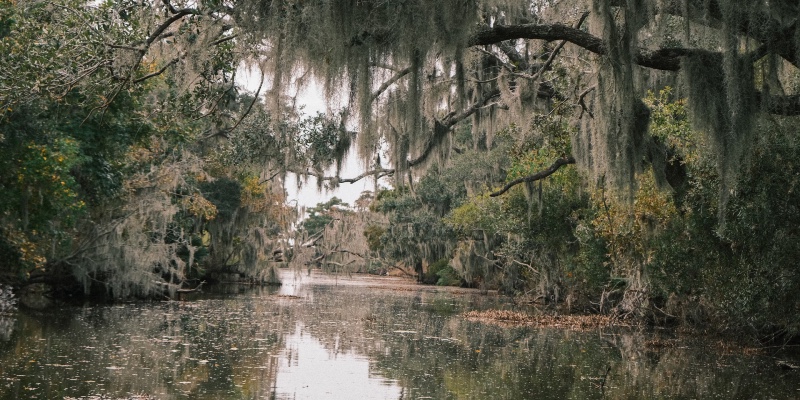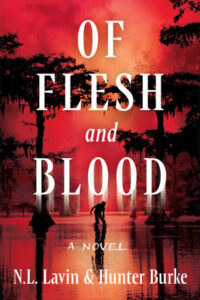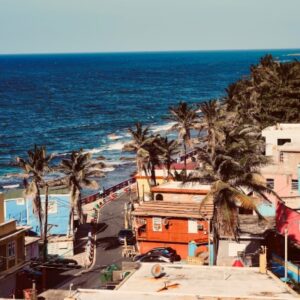“Louisiana is a fresh air mental asylum,” a hard-nosed private investigator growls to a low-level bookmaker in James Lee Burke’s Pegasus Descending. While those are no doubt fighting words to our Pelican State brethren, he’s technically not wrong. In 1699, bereft of resources and hoping to bolster the newly “acquired” New World colony, France expelled prisoners, sex workers, military deserters, and other persona non grata to its Louisiana territory. Perhaps the reason Louisiana feels so ripe for literary crime and misadventure lies in its unsavory heritage and the sins of our fathers. It all gets passed along.
[Upon completing this sentence, Hunter was smacked upside the head with a pirogue paddle by an overzealous Cajun uncle named Mitch, who apparently took issue with his assessment of their culture’s violent history.]
[While Hunter wobbled to the kitchen for a bag of frozen peas, N.L. seized the opportunity to type in his stead, careful not to besmirch any ancestors or catch Mitch’s ire.]
Sure, a chaotic history of rebellions and massacres, slavery and Jim Crow, corrupt politicians and exiled criminals has flavored Louisiana’s reputation as a mysterious and volatile den of all things noir. But what Hunter overlooks is that a history of violence and turmoil is hardly monopolized by our part of the world. Nor does that legacy tell the whole story. It’s simply one strand on the double helix of Louisiana’s uncanny DNA.
The other spiral that sends Louisiana so firmly into the pantheon of crime fiction is its geography. This “Sportsman’s Paradise,” as our license plates boast, is home to the sprawling Atchafalaya River Basin, millions of acres of coastal marshlands, and the Mississippi delta. More than half the state is either wetlands or water. And that water is as murky as the state’s history. Lord knows what could be hidden in the soft muck lurking underneath. Remote hunting camps, dilapidated houseboats, and solitary trailers pepper the landscape, providing few clues as to the goings-on in between. The yearly hurricanes brewed up by the gulf below only serve to ravage any society audacious enough to plant a flag in the silty mud, and sweep its secrets into the surrounding brown waters.
[Hunter then yelled from the kitchen, “Don’t forget about the heat!”]
[N.L. huffed. “Yeah, yeah. I was getting to that.”]
South Louisiana is hot. I mean, Arizona is hot. Georgia is hot. Anywhere can occasionally be hot. But South Louisiana buries you in its heat, encapsulates you in a—
[Uncle Mitch tilted his heft forward over N.L.’s shoulder and squinted at the computer screen. “Encapsulates! Shoo! Lemme see that.” He shoved N.L. aside and cracked his fingers over the keyboard.]
Look. It’s hot hot down here. That’s all you got to say about it. In fact, it got so hot one time that I saw the Virgin Mary in a cypress tree on my property and I call up my buddy Cephus and tell him about it and next thing you know a whole church is out on my lawn prayin up at this tree. Buncha guilty Catholics in a heat stroke. And ol’ Cephus starts sneakin’ round behind ’em and grabbin’ what he can out their purses and whatnot. Called it his collection basket. The priest caught him but Cephus cut Father in so he didn’t tell nobody. And later on, all three of us went and had some of Cephus’s bathtub gin and I woke up in the confessional without a shirt.
[N.L. interrupted from over his shoulder, “Uncle Mitch, is there a point to that story?”]
[Mitch glared back at him. “The point, Dr. Fancy Pants, is this: You can’t trust nobody when everybody’s sweatin’.”]
[N.L. couldn’t argue with that.]
[Hunter finally returned and wrestled the computer away from Uncle Mitch. Mitch, hearing the vague whine of sirens echoing over the rice fields, grabbed his keys, cracked open a beer that had been in his cargo pocket, and left.]
Uncle Mitch may have accidentally made an actual, valid point. Colorful and multi-faceted people like him (and Cephus, I guess) are a huge part of what brings Louisiana to life in literature. We inherit strong belief systems from our cultural mixing pot that include Voodoo priestesses, swamp monsters stalking the bayou, and the hope that the Saints could actually win another Super Bowl. We inhabit an unforgiving land that demands resilience, which can lead to the formation of volunteer search and rescue groups like the Cajun Navy. But with that hard-earned underdog mentality comes an ever-present friction with any oppositional institution that threatens our way of life. Add to that a high poverty rate, lack of mental health access, and an economy propped up by volatile energy and agriculture sectors, and Louisiana becomes not only an ideal setting but a rich, textured character in literary crime fiction.
Here are some of our favorite Louisiana crime stories:
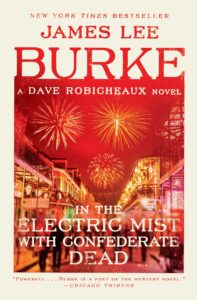
In the Electric Mist with Confederate Dead by James Lee Burke
A favorite in the Dave Robicheaux series finds the former Big Easy cop back in his rural Cajun country hometown, on the hunt for a serial killer targeting young sex workers. JLB’s prose is unmatched as a literary crime writer, and here, it’s especially electric, as he dips a toe into supernatural waters. By page three, you’ll be sweating and swatting at phantom mosquitoes.
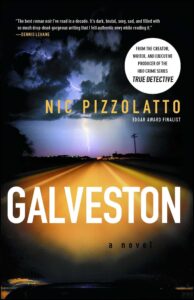
Galveston by Nic Pizzolatto
In this novel full of boozing, scheming, and double-crossing, the only refuge for a New Orleans hitman is to drive across Louisiana and get as far away from the Crescent City as possible. If Galveston, Texas, is your safe haven, the state you have to cross to get there is a brutal, bloody purgatory.
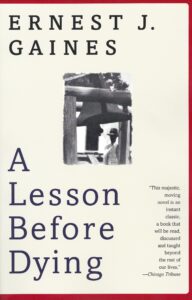
A Lesson Before Dying by Ernest J. Gaines
Exemplifying the wide spectrum of crime stories in Louisiana, this award-winning masterpiece, set during the Jim Crow era in South Louisiana, follows a Black teacher’s quest to awaken humanity in an innocent Black man awaiting execution. This is Gaines at the peak of his powers, blending courtroom drama and character study to expose the insidious machinations of a criminal system built on a racist foundation.
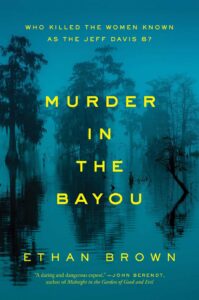
Murder in the Bayou by Ethan Brown
The only nonfiction work to make our list, this true crime tale from investigative journalist Ethan Brown examines the murders of eight women over the course of four years in a sleepy southwest Louisiana parish. This shocking story is a must-read for fans of I’ll Be Gone in the Dark and the television show True Detective.
***

